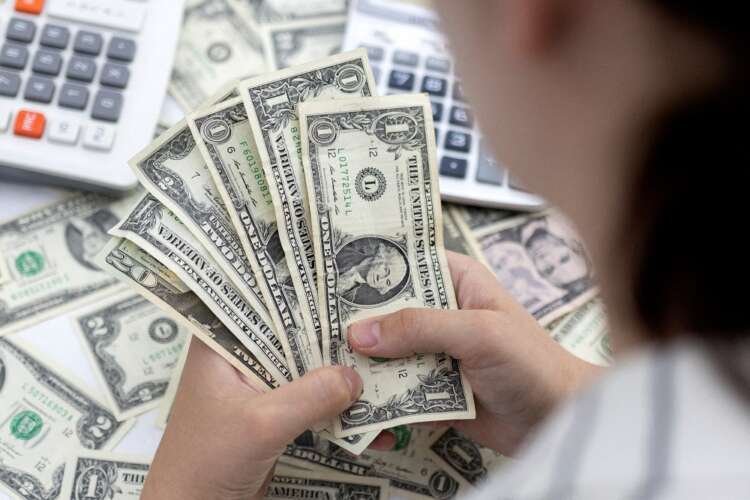Dollar falls as Fed decision looms, yen and real gain
Published by Jessica Weisman-Pitts
Posted on November 2, 2022
4 min readLast updated: February 3, 2026

Published by Jessica Weisman-Pitts
Posted on November 2, 2022
4 min readLast updated: February 3, 2026

By Joice Alves and Kevin Buckland
LONDON/TOKYO (Reuters) – The dollar slipped on Wednesday as investors awaited a Federal Reserve policy decision amid speculation it might indicate a slowdown in future rate hikes.
The central bank will release its policy statement at 2 p.m. EDT (1800 GMT), with investors widely expecting a 75 basis points (bps) rate hike, the fourth such increase in a row.
But for the December meeting, the futures market is split on the odds of a 75- or 50-bps increase.
The dollar index – which gauges the greenback against a basket of six counterparts that includes the yen, euro and sterling – eased 0.2% to 111.27, but was not far below Tuesday’s high of 111.78, the strongest level since Oct. 25.
“The market will be looking for signs of a potential slowdown in the pace of hikes at the December meeting, especially in (Fed Chair Jerome) Powell’s press conference … It will be a difficult balance to strike for Powell,” said Daria Parkhomenko, FX strategist at RBC Capital Markets.
“We think the Fed will want to maintain optionality of hiking 50 bps or 75 bps in December, as there are still another two CPI (inflation) reports and two NFP (non-farm payroll report) releases ahead of that meeting,” she added.
Against the weakening dollar, the euro and sterling edged up to $0.9890 and $1.1502, respectively.
The Bank of England announces its policy decision on Thursday, and markets expect a 75-bps increase there as well, followed by a slowdown to a 50-bps pace in December.
The risk-sensitive Australian and New Zealand dollars rose strongly, buoyed by a rally in Chinese equity markets as speculation started to build about an economic reopening.
BRAZILIAN REAL
Brazil’s real has been closely watched after it hit a four-week high of 5.08 real per dollar on Tuesday as President Jair Bolsonaro’s administration said it would begin the transition to Luiz Inacio Lula da Silva’s government and allayed worries over political instability. The real was 0.1% higher exchanging hands for 5.14 per dollar.
The currency has strengthened almost 3% this week, since da Silva won the presidential election on Sunday.
“So far the Brazilian real was able to benefit from the outcome of the presidential elections. Compared with LatAm peers it is a clear outperformer,” said Ulrich Leuchtmann, Head of FX at Commerzbank.
YEN JUMPS
The yen, down a whopping 28% against the dollar this year, outperformed on Wednesday, with traders on alert for possible intervention around the Fed meeting. It rose 0.8% to 147.07 per dollar.
GRAPHIC – G10 FX
https://fingfx.thomsonreuters.com/gfx/mkt/znvnbdqajvl/G10%20FX.png
The Ministry of Finance and Bank of Japan intervened to support the currency in September for the first time since 1998.
Japanese authorities are widely considered to have waded in several times again in October to pull the yen back from 32-year lows just shy of 152 per dollar, although they declined to confirm any action.
“This doesn’t look like intervention to me,” said Ray Attrill, head of FX strategy at National Australia Bank.
“On the three occasions that we know about, the BOJ intervened in enormous size and repeatedly, and if we were seeing intervention now – unless the pattern has changed – I would expect we would see much more significant movements that would be continuing now.”
Analysts said the initial leap in the yen coincided with several events that could have played a role, including a drop in long-term U.S. Treasury yields, to which the dollar-yen rate is strongly correlated.
Japanese officials were also speaking in parliament, including BOJ Governor Haruhiko Kuroda, who said that increasing flexibility in the yield curve control policy could be a future option, and Finance Minister Shunichi Suzuki, who said later in the day that the government was concerned about steady yen depreciation as well as speculative moves.
The BOJ also released minutes of its latest policy meeting, with a member saying the bank must be vigilant for an inflation overshoot, possibly caused by yen weakness.
North Korea fired several missiles around the same time too.
(Reporting by Joice Alves and Kevin Buckland; Editing by Mark Potter and Alex Richardson)
The Federal Reserve, often referred to as the Fed, is the central bank of the United States, responsible for implementing monetary policy and regulating financial institutions.
A currency index measures the value of one currency against a basket of other currencies, providing insights into its relative strength or weakness.
A basis point is a unit of measurement used in finance to describe the percentage change in value or interest rates, equal to one-hundredth of a percentage point.
Monetary policy refers to the actions taken by a central bank to manage the money supply and interest rates to achieve economic objectives such as controlling inflation.
The Brazilian real is the official currency of Brazil, denoted by the symbol R$ and is used in all financial transactions within the country.
Explore more articles in the Trading category











